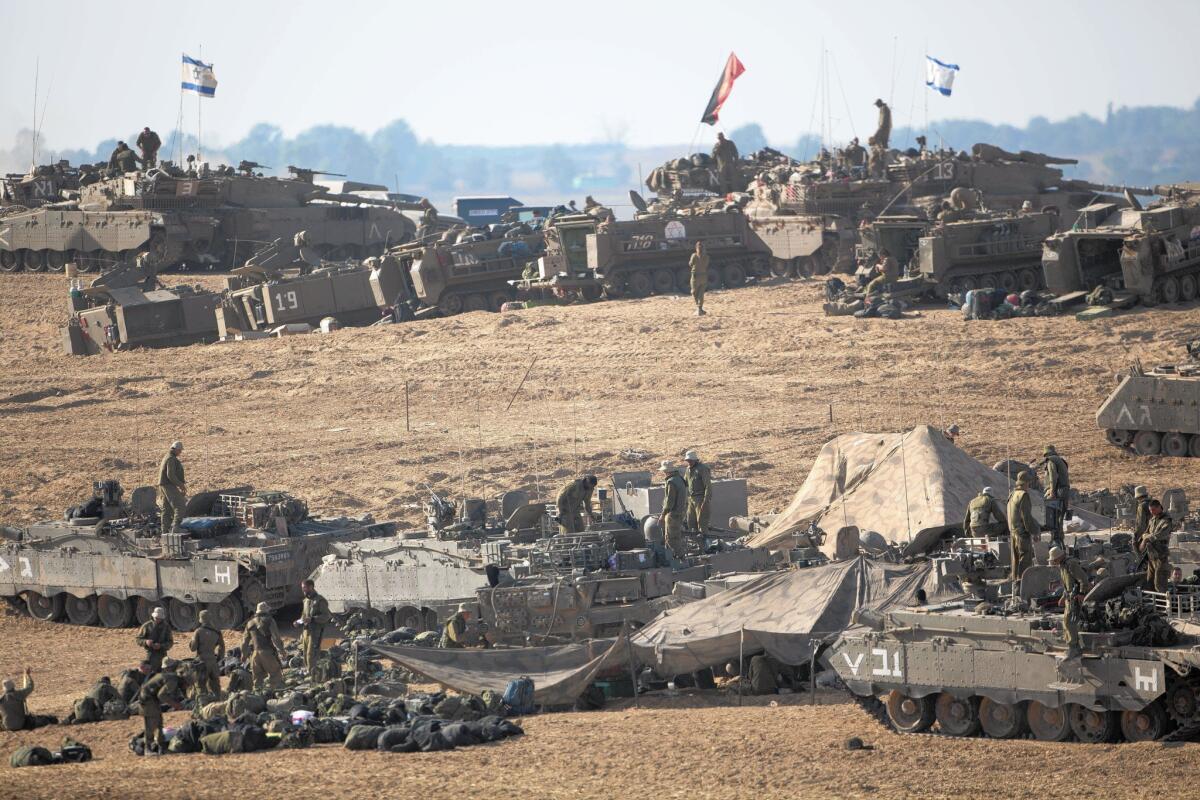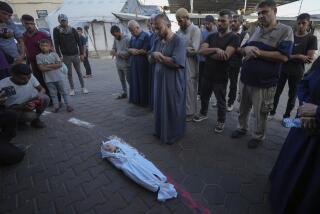Gaza flare-up brings all-too-familiar dread to Israelis, Palestinians

Reporting from Jerusalem — With rockets showering down on Israel and corpses piling up in Gaza, residents on either side of the divide have been left with a dreadful feeling of deja vu.
But the question is: Are they witnessing a rerun from 2009 or from 2012?
In January 2009, Israeli tanks withdrew from the Gaza Strip after a 22-day offensive mounted in response to increased rocket fire from Islamic militants inside the narrow seaside enclave. More than 1,000 Palestinians were killed, hundreds of them civilians; 13 Israelis died, most of them soldiers.
In November 2012, hostilities flared again. Israel girded itself for another ground operation; Hamas, the extremist group that controls Gaza, vowed resistance. But an internationally brokered cease-fire meant the threatened incursion never materialized.
The current outbreak of violence has shattered that truce — and left the Israeli government to ponder once again whether to send in its soldiers for a ground campaign that could prove costly in blood, economic resources and international opinion.
Rockets continued to barrage Israel on Thursday, reaching deep inside the country, while Israeli warplanes fired missiles at suspected launch sites and weapons stockpiles in Gaza for a third day. More than 80 Palestinians have been killed in the confrontation so far; no Israelis have died.
President Obama spoke to Israeli Prime Minister Benjamin Netanyahu by phone, affirming Israel’s right to defend itself and offering U.S. help in negotiating a cease-fire.
Israel’s leaders say a ground offensive remains an option. The government has begun mobilizing as many as 40,000 reservists and deployed more troops along the border with Gaza.
But many analysts think that, for now at least, a land assault is unlikely.
A brief ground operation would achieve few important objectives beyond showing that Israel means business, while a prolonged one could spark public opposition over increasing Israeli casualties or international condemnation over large numbers of Palestinian deaths.
Also, the success of Israel’s new missile defense shield, Iron Dome, in knocking out dozens of Hamas’ rockets has rendered the bombardment from Gaza slightly less terrifying.
At this point, the warnings from Netanyahu of a potential incursion into Gaza are about deterrence and making a show of force, some analysts say, as well as to mollify the more hawkish elements in his coalition government and in the general public. In 2012, even more reservists were summoned — about 60,000 — and in less time, but they went home having seen little action.
“If you’re trying to deliver a major threat, you’ve got to call up reservists or no one believes you. You’ve got to put tanks on the border or no one believes you,” said Daniel Levy, an expert on the Middle East at the European Council on Foreign Relations. “But I don’t think there’s an intention here to have major boots on the ground.”
Currently, Israel and Gaza’s militants are locked in a frightening but familiar pas de deux that has played out in similar fashion innumerable times.
Fighters with Hamas or other radical groups such as Islamic Jihad launch rockets at Israeli population centers, though now with worrisomely greater range; Israeli jets and drones blow up buildings, cars and people suspected of militant involvement in Gaza.
“It pains me, and it should pain us all, to be reliving circumstances that are all too reminiscent of the two most recent wars in Gaza,” United Nations Secretary-General Ban Ki-moon said Thursday, referring to the conflicts in 2009 and 2012.
“We must keep the situation from getting any further out of control,” Ban told an emergency meeting of the U.N. Security Council. “Any further spiral of violence could have alarming, unforeseen consequences.”
Ban characterized the situation as being on a knife edge. Both sides are largely sticking to their usual script now, with Israel focused primarily on its aerial campaign, but even analysts who deem a ground war less likely acknowledge that the situation is highly volatile.
“All this can change in a heartbeat if a rocket lands on a kindergarten in Israel or a bomb lands on a kindergarten in Gaza, changing the game rules in an instant,” said retired Israeli Brig. Gen. Gadi Zohar, chairman of the Peace and Security Council, an organization of former security officials and diplomats who support the moribund Middle East peace process.
In the event of major Israeli casualties from a Hamas rocket, the pressure on Netanyahu to respond with overwhelming force would probably overpower what many analysts say is his personal reluctance to enter into a messy, deadly ground conflict.
Yet the military benefits of such an assault would still be questionable.
Almost no one envisions a full, open-ended Israeli reoccupation of the Gaza Strip. But without that, trying to root out completely the terrorist infrastructure there, against fighters who have improved their capabilities and skills, would be a tall order.
The army prepared a long time for Israel’s three-week ground operation in 2008-09, said Amir Rapaport, a researcher with the Begin-Sadat Center for Strategic Studies in Tel Aviv. “Every force knew exactly what it was supposed to do, whereas there has been far less time to prepare now.
“Hamas and others’ capabilities have improved during this period, which they have used to set up traps, pits, weaponry,” Rapaport said. “Time is a factor, and they have learned lessons from past rounds.”
A ground offensive would also have to be calibrated finely enough to weaken Hamas but not to rout it from Gaza, analysts say. Although Israeli officials detest Hamas, it’s a known quantity, and preferable to a power vacuum that could be filled by more dangerous groups.
Lt. Col. Peter Lerner, an Israeli military spokesman, told reporters Thursday that the pros and cons of a land offensive were still being weighed.
“The ground option needs to be the last option, and only if it is absolutely necessary,” he said. “It is a carefully designed plan of action.”
Israel’s aerial campaign has been executed with vigor since it began early Tuesday. In the first 48 hours, warplanes struck 750 sites in the Gaza Strip, more than half the number targeted during Israel’s eight-day military campaign in Gaza in November 2012.
Palestinian health officials said numerous civilians have died in the strikes. Thursday’s death toll reportedly included at least seven members of the same family, who died in an airstrike on their home in the southern Gaza city of Khan Yunis.
At least 22 people were killed in Gaza on Thursday, including three men whom Israel identified as members of Islamic Jihad. The death toll in the territory now exceeds 89 and the number of wounded more than 600.
“Israel has legitimate security concerns, but I’m also concerned at the many Palestinian deaths and injuries as a result of Israel’s operations,” Ban said at the United Nations. “Once again Palestinian civilians are caught between Hamas’ irresponsibility and Israel’s tough response.”
Militants struck back with more than 120 rockets aimed at Israel, some of which reached Tel Aviv and Jerusalem. The only Israeli injuries reported so far have been light.
Palestinian analyst Fayez Abbas said the confrontation had become a faceoff between Hamas’ rockets and Israel’s defense shield.
“Israel is going to run out of missiles [for Iron Dome] before Hamas, and then what will happen?” Abbas said. “Hamas knows this, and knows that it just has to continue with firing the missiles a while longer until Israel gets tired and agrees to a cease-fire.”
The question is who would broker such a truce. In 2012, Egypt, then under the rule of the Muslim Brotherhood, which was sympathetic to and wielded influence with Hamas, led the way with help from the United States.
But Cairo’s new military-backed government has given Hamas a cold shoulder and shut down many of the tunnels linking Egypt and Gaza, through which residents smuggled not just weapons but also food and other goods to help ease the territory’s economic isolation.
A spokeswoman for the U.S. National Security Council, Caitlin Hayden, said Thursday evening that the United States has not changed its policy of avoiding direct contact with Hamas, but said, “There are players in the region with whom we could work.”
Senior administration officials, speaking on condition of anonymity because the topic involved diplomacy, said the U.S. believed the Egyptians might still be able to play a role, but also mentioned Qatar and Turkey as possible intermediaries.
U.S. Secretary of State John F. Kerry, in Beijing for a summit, called it a “dangerous moment” for the Middle East. He said he had spoken with Netanyahu and Palestinian Authority President Mahmoud Abbas.
“You need the right channels to dial things down,” said Levy of the European Council on Foreign Relations, “and we have much less of that available this time.”
Special correspondent Sobelman reported from Jerusalem and Times staff writer Chu from London. Times staff writer Christi Parsons in Washington and special correspondents Rushdi abu Alouf in Gaza City and Maher Abukhater in Ramallah, West Bank, contributed to this report.
Follow @HenryHChu on Twitter
More to Read
Sign up for Essential California
The most important California stories and recommendations in your inbox every morning.
You may occasionally receive promotional content from the Los Angeles Times.











